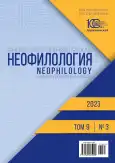Principles of delimitation of speech genres expressing a positive assessment
- Authors: Anisimova T.V.1, Chubay S.A.2
-
Affiliations:
- Kaliningrad Branch of the Saint Petersburg University of the Ministry of Internal Affairs of the Russia
- Volgograd State University
- Issue: Vol 9, No 3 (2023)
- Pages: 519-533
- Section: RUSSIAN LANGUAGE. LANGUAGES OF PEOPLES OF RUSSIA
- URL: https://journal-vniispk.ru/2587-6953/article/view/295727
- DOI: https://doi.org/10.20310/2587-6953-2023-9-3-519-533
- ID: 295727
Cite item
Full Text
Abstract
We consider the possibility question of an unambiguous distinction between genres close in meaning, included in the same thematic group. The aim of the study is to describe the rhetorical parameters of the genres of praise, approval, compliment and flattery, which are included in the genres group of a positive assessment of a person and his actions, as well as to develop criteria for distinguishing between these genres. All genres belonging to this group are united by the addresser position: he experiences (or pretends to experience) one or another positive attitude, which he wants to notify the addressee about. The rhetorical features of all genres of the group are described in detail and the characteristics by which they can be distinguished are highlighted. Praise is considered to be the group central element of positively evaluative genres. A comparison of praise with other genres shows that the differences most often relate to the object of evaluation (in praise, the object is a person, and in approval, ideas, projects and other products of intellectual activity) and the nature of the assessments used (praise is based on objective assessments, and compliments are based on subjective assessments).
Keywords
About the authors
T. V. Anisimova
Kaliningrad Branch of the Saint Petersburg University of the Ministry of Internal Affairs of the Russia
Email: atvritor@yandex.ru
ORCID iD: 0000-0002-6386-2041
Dr. habil. (Philology), Professor, Professor of Socio-Economic and Humanitarian Disciplines Department
30 General Galitsky St., Kaliningrad, 236006, Russian FederationS. A. Chubay
Volgograd State University
Author for correspondence.
Email: sa_chubai@volsu.ru
ORCID iD: 0000-0002-3660-8267
PhD (Philology), Associate Professor, Associate Professor of Russian Philology and Journalism Department
100 Universitetskiy Ave., Volgograd, 400062, Russian FederationReferences
- Leont’ev V.V. Praise differs: to the issue of conceptualising praise in English lingua-culture. Izvestiya Volgo-gradskogo gosudarstvennogo pedagogicheskogo universiteta = Ivzestia of the Volgograd State Pedagogical University, 2022, no. 3 (166), pp. 245-251. (In Russ.) https://elibrary.ru/yripor
- Zimbuli A.E. Pokhvala: nravstvenno-tsennostnye rakursy [Praise: moral and value perspectives]. Simvol nauki: mezhdunarodnyi nauchnyi zhurnal = Symbol of Science: International Scientific Journal, 2015, no. 7-2, pp. 65-71. (In Russ.) https://elibrary.ru/ucvyod
- Yankina E.V. Social support addressee. Izvestiya Volgogradskogo gosudarstvennogo tekhnicheskogo universiteta. Seriya: Problemy sotsial’no-gumanitarnogo znaniya = Ivzestia of the Volgograd State Technical University. Series: Problems of Socio-Humanitarian Knowledge, 2013, vol. 14, no. 16 (119), pp. 53-56. (In Russ.) https://elibrary.ru/rmtfgp
- Gorobets O.B. Praise and compliment: inter-genre boundaries. Uchenye zapiski Komsomol’skogo-na-Amure gosudarstvennogo tekhnicheskogo universiteta = Scientific Notes of Komsomolsk-On-Amour State Technical University, 2010, vol. 2, no. 2, pp. 75-80. (In Russ.) https://elibrary.ru/mqpmvn
- Sapunova A.V. Kritika i pokhvala podchinennykh – moshchnoe sredstvo aktivizatsii ikh deyatel’nosti [Crit-icism and praise of subordinates is a powerful means of activating their activities.]. Novaya apteka. Effektivnoe upravlenie [New Pharmacy. Efficient Management], 2008, no. 12, pp. 46-49. (In Russ.) https://elibrary.ru/jxgwld
- Zhumakeeva E.B., Dzharkinbaeva N.B. The lexical and grammatical expression of approval-praise and disap-proval-discontent in a specific speech situation. Alatoo Academic Studies, 2021, no. 3, pp. 171-183. (In Russ.) https://doi.org/10.17015/aas.2021.213.019, https://elibrary.ru/mugjdr
- Pogozhaya S.N. The peculiarities of representation of concept «Approval/praise» in modern English. Nauchnye vedomosti Belgorodskogo gosudarstvennogo universiteta. Seriya: Gumanitarnye nauki = Belgorod State Uni-versity Scientific Bulletin. Series: Humanities, 2014, no. 13 (184), pp. 119-125. (In Russ.) https://elibrary.ru/tfxgtr
- Formanovskaya N.I. Odobrenie, pokhvala [Approval, praise]. In: Skovorodnikov A.P. (ed.). Slovar’-spravochnik «Effektivnoe rechevoe obshchenie (bazovye kompetentsii)» [Dictionary-Guide Book “Effective Verbal Communication (Basic Competencies)”]. Krasnoyarsk, Siberian Federal University Publ., 2014, pp. 356-357. (In Russ.) https://elibrary.ru/uqajoz
- Sultash S.A., Galichkina E.N. Genre and stylistic characteristics of online-comments of “approval” in VK. Gu-manitarnye nauki i obrazovanie = The Humanities and Education, 2022, vol. 13, no. 4 (52), pp. 153-160. (In Russ.) https://doi.org/10.51609/2079-3499_2022_13_04_153, https://elibrary.ru/gwjwcw
- Goryainova N.N. Strategii i taktiki rechevogo povedeniya s primeneniem vyskazyvanii pokhvaly i odobreniya: dis. ... kand. filol. nauk [Strategies and Tactics of Speech Behavior Using the Expression of Praise and Approval. PhD (Philology) diss.]. Stavropol, 2010, 194 p. (In Russ.) https://elibrary.ru/ooruok
- Anisimova T.V. On the question of the meaning of the term speech genre. Vestnik Volzhskogo universiteta im. V.N. Tatishcheva = Vestnik of Volzhsky University after V.N. Tatischev, 2019, vol. 1, no. 1, pp. 104-111. (In Russ.) https://elibrary.ru/ppxxsf
- Anisimova T.V., Prigarina N.K., Chubai S.A. The system of rhetorical argumentation in discourse of social ad-vertising. Vestnik Volgogradskogo gosudarstvennogo universiteta. Seriya 2: Yazykoznanie = Science Journal of Volgograd State University. Linguistics, 2019, vol. 18, no. 2, pp. 159-173. (In Russ.) http://doi.org/10.15688/jvolsu2.2019.2.14, https://elibrary.ru/xctztj
- Trofimova N.A. Grammatika pokhvaly. Yazykovye sredstva realizatsii rechevogo akta pokhvaly [Praise gram-mar. Language means of implementing the speech act of praise]. Al’manakh sovremennoi nauki i obrazovaniya = Almanac of Modern Science and Education, 2007, no. 3-3, pp. 228-231. (In Russ.) https://elibrary.ru/peizfr
- Voronina N.V., Goryainova N.N. Praise and approval as the methods of motivations during the educational activity at the English lesson. Nauchnye gorizonty [Scientific Horizons], 2017, no. 3, pp. 51-54. (In Russ.) https://elibrary.ru/yorrne
- Temirgazina Z.K., Bachurka M.S. Speech acts of praise and approval in the pedagogical discourse. Vestnik RUDN. Seriya: Teoriya yazyka. Semiotika. Semantika = RUDN Journal of Language Studies, Semiotics and Semantics, 2017, vol. 8, no. 1, pp. 97-105. (In Russ.) https://doi.org/10.22363/2313-2299-2017-8-1-97-105, https://elibrary.ru/yfubpj
- Bigunova N.A. Approval, praise, compliment and flattery in speech act theory. Zapiski z romano-germans’koї fіlologії [Notes on Romano-Germanic Philology], 2015, no. 2 (35), pp. 31-40. (In Russ.) https://elibrary.ru/wkdwmp
Supplementary files









